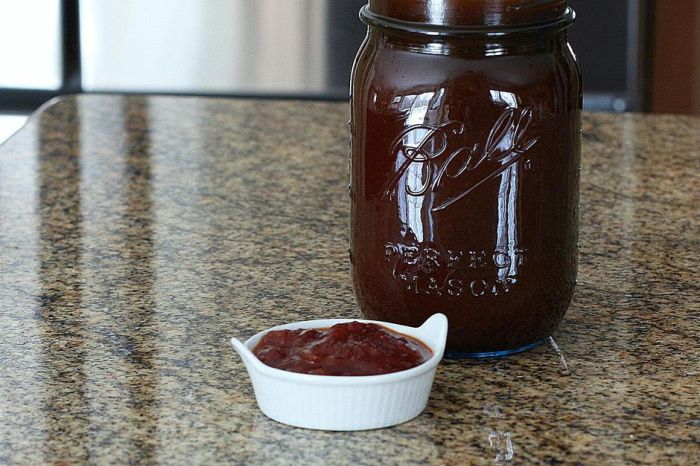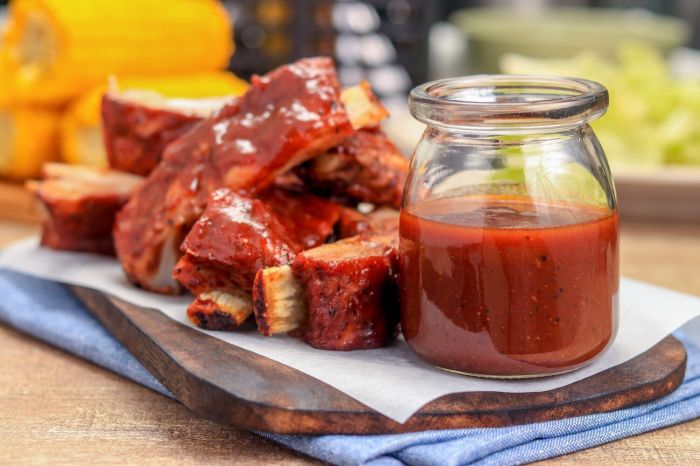BBQ Sauce with Beer Recipe A Brewing Delight
Beer-Infused BBQ Sauce: A Flavorful Fusion: Bbq Sauce With Beer Recipe
Bbq sauce with beer recipe – The marriage of beer and barbecue sauce is a testament to culinary innovation, blending the robust notes of fermented barley with the sweet and smoky essence of classic BBQ. This delightful combination isn’t a recent trend; the use of beer in BBQ sauces has a rich, albeit somewhat undocumented, history, likely stemming from the practical application of readily available ingredients in the American South.
This article delves into the art of crafting beer-infused BBQ sauces, exploring various beer types, recipe variations, cooking methods, and serving suggestions.
Introduction to Beer-Infused BBQ Sauce

Source: thespruceeats.com
The use of beer in BBQ sauces adds depth and complexity, enhancing the existing flavors rather than masking them. Brewers’ yeasts and the resulting esters and alcohols contribute to the sauce’s overall taste profile. The history of this practice is intertwined with the history of brewing in America, with regional variations developing over time. Different beer styles offer unique flavor profiles, impacting the final taste of the sauce.
The Maillard reaction, crucial in BBQ, is further enhanced by the sugars and amino acids present in beer, leading to a richer color and more intense flavor.
Beer Selection & Flavor Profiles

Source: thespruceeats.com
Three distinct beer types – stout, IPA, and lager – offer diverse flavor profiles ideal for crafting unique BBQ sauces. The choice of beer significantly impacts the final sauce’s character. The table below illustrates the differences:
| Beer Type | Expected Flavor Profile | Suggested Pairings | Recipe Notes |
|---|---|---|---|
| Stout | Rich, dark, roasted malt notes, hints of chocolate and coffee | Beef brisket, ribs | Creates a deep, savory sauce. |
| IPA | Hoppy, bitter, citrusy, slightly fruity | Chicken, pork tenderloin | Adds a zesty, refreshing twist. |
| Lager | Light, crisp, malty, slightly sweet | Pulled pork, sausages | Provides a clean, balanced base. |
Smoky Stout BBQ Sauce Recipe
This recipe uses a dark stout for a smoky, rich sauce. The finished sauce is a deep, almost black color, with a thick, glossy consistency. The roasted malt notes of the stout are prominent, complemented by the sweetness of the brown sugar and the smokiness of the smoked paprika.
(Detailed recipe instructions would be included here)
Bright Lager BBQ Sauce Recipe
This recipe uses a light lager for a brighter, less intense sauce. The finished sauce is a thinner, more translucent amber color, with a smooth, slightly tangy texture. The lager’s subtle maltiness provides a clean background for the other ingredients to shine.
(Detailed recipe instructions would be included here)
Ingredient Selection and Preparation
Beyond the beer, high-quality ingredients are paramount for a superior BBQ sauce. Fresh, ripe tomatoes, onions, garlic, and peppers form the base. Using good quality ingredients directly impacts the final taste and depth of flavor. Proper preparation involves finely dicing onions and garlic to release their flavors during cooking and removing the seeds and membranes from peppers to control the level of heat.
- High-quality ketchup or tomato paste
- Brown sugar or molasses for sweetness
- Apple cider vinegar or Worcestershire sauce for acidity
- Spices such as smoked paprika, chili powder, black pepper, and cayenne pepper
- Optional additions: liquid smoke, mustard, honey
Cooking Methods and Techniques
Several methods can be used to make beer BBQ sauce, each offering unique advantages. The choice depends on available time and equipment.
- Stovetop: Offers precise control over the cooking process, allowing for adjustments to consistency and flavor.
- Slow Cooker: Ideal for a hands-off approach, resulting in a tender and flavorful sauce. Requires longer cooking time.
- Smoker: Infuses the sauce with a deeper smoky flavor, ideal for pairing with smoked meats. Requires a smoker and careful temperature control.
(Detailed stovetop and slow cooker instructions would be included here)
Serving Suggestions and Pairings
Beer-infused BBQ sauces pair well with a variety of meats and side dishes. The specific beer used influences the best pairings.
- Meats: Ribs, brisket, pulled pork, chicken, sausages
- Side Dishes: Coleslaw, potato salad, cornbread, baked beans
A Sample Menu: Smoked brisket with smoky stout BBQ sauce, creamy coleslaw, and cornbread. The rich, savory sauce complements the tender brisket perfectly, while the coleslaw and cornbread provide a refreshing contrast.
Storage and Shelf Life, Bbq sauce with beer recipe
Proper storage is crucial for extending the shelf life of homemade BBQ sauce. Factors influencing shelf life include the ingredients used, the cooking method, and storage conditions. Refrigeration is essential, and the sauce should be stored in airtight containers. Discard the sauce if it exhibits any signs of spoilage, such as mold growth, off-odors, or unusual changes in texture.
Recipe Modifications and Adaptations
Adapting recipes to accommodate dietary restrictions and personal preferences is straightforward. Gluten-free options can be achieved by using gluten-free beer and ensuring all other ingredients are gluten-free. Vegan versions can be created by replacing honey with maple syrup or agave nectar. The sweetness and spiciness levels can be adjusted by modifying the amount of sugar and chili powder, respectively. Consistency can be altered by simmering longer to thicken or adding a small amount of water or broth to thin.
Top FAQs
Can I use any type of beer?
While most beers work, avoid overly hoppy IPAs which might impart a bitterness that clashes with the sweetness of the sauce. Lagers, stouts, and even some ales are excellent choices.
How long will homemade BBQ sauce last?
Properly stored in the refrigerator, homemade BBQ sauce typically lasts for 1-2 weeks. Freezing extends its shelf life considerably.
What if my sauce is too thick/thin?
Crafting a delicious BBQ sauce with beer involves balancing sweet and smoky flavors. Interestingly, the foundational techniques are surprisingly similar to making a great meat sauce, such as a simple basic spaghetti meat sauce recipe , where building layers of flavor through browning and simmering is key. The resulting depth of flavor translates well to both sauces, though BBQ sauce obviously incorporates more smoke and sweetness.
To thicken, simmer uncovered for longer. To thin, add a small amount of water or beer.
Can I make this sauce ahead of time?
Yes! The flavor actually improves after a day or two of refrigeration, allowing the flavors to meld.





















